Advertisement
|
Study: Core Commercial Radio Fans Weigh in on AI
| RADIO ONLINE | Thursday, March 28, 2024 | 3:03pm CT |





|
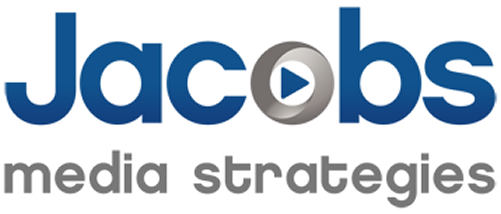 |
The big story in broadcast radio and all of media is the impact of Artificial Intelligence. In the past year, much has been said and written about how radio broadcasters -- from management to talent -- feel about this burgeoning technology. But now thanks to the early-released feedback from more than 31,000 core radio fans from across the U.S. and Canada who responded to Jacobs Media's Techsurvey 2024, findings have emerged. The study was fielded in January and February of this year.
As Jacobs Media President Fred Jacobs noted, "Many radio companies have jumped on the AI bandwagon but with little guidance from their audience. This exclusive data from Techsurvey 2024 provides valuable feedback from partisans of 10 popular radio formats about their hopes and for now at least, fears of AI."
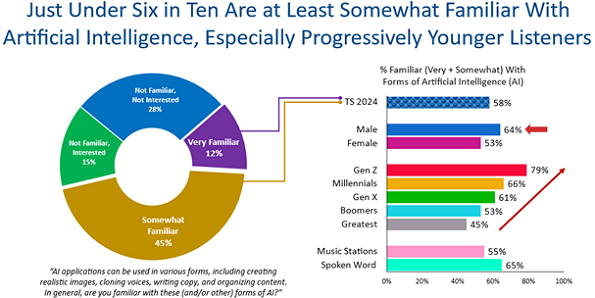
First and foremost, a solid majority (58%) say they're very or somewhat familiar with Artificial Intelligence. Men, as well as members of Generation Z, Millennials, and Gen Xers are more apt to say they're familiar with this new technology. And of those familiar with AI, nearly one in ten (9%) uses its applications for personal, work, or school. Gen Z and Millennial respondents are most likely to say they use it at least weekly.
As for format fans, core listeners to Alternative stations are most apt to regularly put AI to use, while partisans of both Classic Hits and Classic Rock radio are least likely to utilize this technology. Similar to what has been seen in Jacobs' Techsurveys in both public and Christian music radio, most people are concerned about the speed at which AI is being adopted. In fact, more than seven in ten (71%) are very or somewhat alarmed at the rate AI is progressing, especially women. But every demographic subgroup is in concurrence about the proliferation of this new technology:
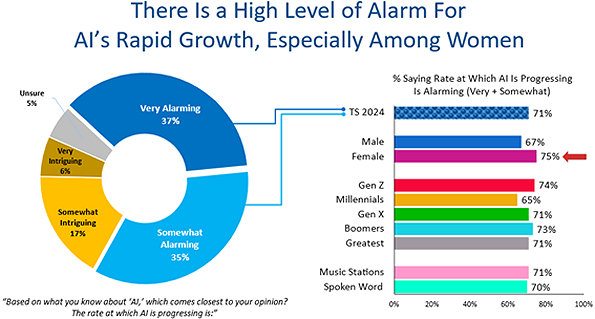
Only 5% believe AI will have a very positive impact on society in the short-term, while just over one in four (27%) believes AI's effect will be somewhat positive. Conversely, a majority (53%) agree Artificial Intelligence will lead to a somewhat or very negative impact on their world. There's a strong feeling the government will need to step in to provide legal guard rails for AI use. Three in four (75%) are looking for some form of regulation. In fact, more than a third (36%) believe AI will need to be highly regulated.
That perception may be fueled by the upcoming elections this November. About half (51%) say they're very concerned about how AI might affect this fall's political races. Members of the Greatest Generation and Boomers are most fearful of how the technology might influence upcoming elections.
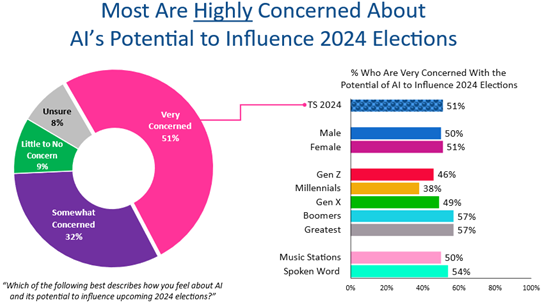
Respondents were asked how they'd feel about AI being used by stations they listen to in three areas:
- AI hosts
- AI voiced commercials
- AI voiced IDs
Of the three concepts, the biggest pushback predictably is directed at the idea of radio using cloned voices to take the place of live talent. In fact, three in four (75%) raise the red flag over this AI application that has generated much publicity in the past year. Concern lessens when it comes to AI voice technology being used to read commercials. Still, nearly four in ten (39%) say they have big issues with radio stations they listen to using AI in ads.
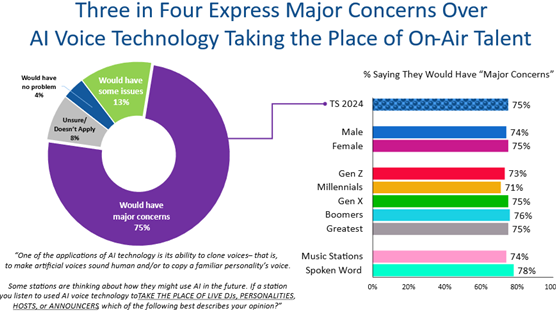
Of the applications tested, respondents are most open to the idea of AI voices being utilized on station identification. Overall, about one-third (34%) have no problem, but a similar sized group (30%) expresses major concerns with this use case for AI. Isolating the question about AI technology taking the place of radio station talent, concern about this application is across the board, with major concerns expressed by at least seven in ten of the demographic subgroups (gender, generation, type of radio station) included in this analysis:
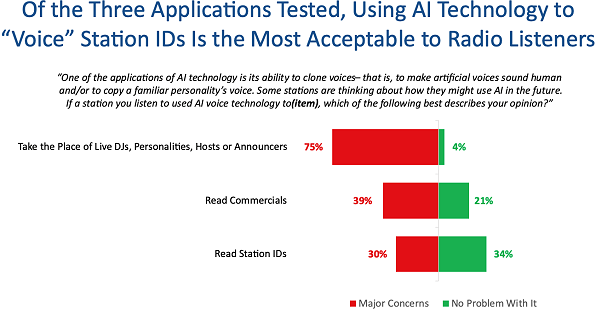
Looking at the 10 radio formats, those who prefer Alternative and Rock, as well as News/Talk, Sports, and Classic Rock voice the strongest concerns. Fans of CHR are less disturbed by AI, but even two-thirds of them (68%) line up against the idea of bot jocks.
GM Paul Jacobs remarked, "It is still early days for AI in radio, but broadcasters need to respect the many concerns voiced by core fans of the medium. Up to now, many decisions have been made in a vacuum. Now the audience has a voice. We'll be tracking their perceptions in Techsurveys in the coming years as the technology matures. The format level data for AI should provide welcome feedback for radio managers trying to get a handle on AI."
Jacobs Media's free all-industry webinar to share Techsurvey 2024 results is scheduled for Thursday, April 25 at 2pm ET.
Advertisement
|
Latest Radio Stories
Connoisseur Media Closes MO, MN, SD Station Sales
|
2026 NAB Show Expands Sports Summit to Four Days
|
Sean Spicer Launches Sunday Show on WABC New York
|
Advertisement
|
Veteran L.A. Personality Uncle Joe Benson Dead at 77
|
Star 92.9 Burlington VT Adds Adri Stuhr to Afternoons
|
Noiser Launches ''Real Vikings'' Podcast
|

















